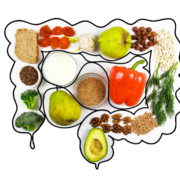Break Free From Chronic Disease
A growing number of people, from young adults to seniors, are being diagnosed with chronic diseases. Unlike acute illnesses, which come on suddenly and resolve fairly quickly, chronic diseases persist for months or even years, often requiring continuous management. Conditions such as irritable bowel syndrome (IBS), autoimmune disorders, anxiety, depression, and even cancer can significantly impact daily life. But many are tired of the day-by-day management and want to know how to break free from chronic disease.
What Makes A Disease Chronic?
A disease is considered chronic when it lasts for three months or more and tends to worsen over time. These conditions often stem from long-term imbalances in the body, influenced by genetics, lifestyle, diet, stress, and environmental toxins. Chronic diseases frequently involve ongoing inflammation, immune system dysfunction, or metabolic issues that prevent the body from restoring balance on its own.
Functional medicine approaches chronic disease by identifying and addressing the root causes, rather than simply suppressing symptoms. By supporting the body’s natural healing mechanisms through proper nutrition, lifestyle modifications, and targeted interventions, we can help restore health and vitality. Let’s explore some of the most common chronic conditions and the functional medicine strategies that can offer relief.
Irritable Bowel Syndrome And Digestive Disorders
Digestive issues are increasingly common, with conditions like IBS, acid reflux, and inflammatory bowel disease affecting millions of people. These disorders often result from gut dysbiosis (an imbalance in gut bacteria), chronic stress, food intolerances, or poor dietary habits.
Functional medicine focuses on:
Healing the digestive system: By identifying and eliminating trigger foods, reducing inflammation, and repairing the gut lining with nutrients like L-glutamine and omega-3s, we can restore balance.
Restoring the microbiome: Probiotics, prebiotics, and fermented foods help repopulate the gut with beneficial bacteria, improving digestion and immune function.
Adjusting diet: An anti-inflammatory, whole-food diet (one rich in fiber, healthy fats, and quality proteins) can significantly improve digestive symptoms and overall health.
Anxiety And Depression
While many view anxiety and depression as purely mental health issues, research shows a strong connection between the gut, brain, and nutrition. The gut microbiome plays a critical role in neurotransmitter production, affecting mood, energy, and cognitive function.
Functional medicine approaches include:
Nutritional intervention: Deficiencies in key nutrients like magnesium, B vitamins, and omega-3 fatty acids can contribute to anxiety and depression. A nutrient-dense diet can help restore balance.
Gut and microbiome support: Since about 90% of serotonin is produced in the gut, a disrupted microbiome can significantly impact mood. Probiotic-rich foods and gut-healing strategies can improve emotional well-being.
Adaptogenic herbs and supplements: Herbs like ashwagandha, rhodiola, and holy basil can help regulate the body’s stress response and support adrenal function, reducing anxiety and fatigue.
Cancer Patients And Survivors
Cancer and its treatments take a significant toll on the body, depleting nutrients, weakening the immune system, and causing long-term side effects. While conventional treatments target cancer cells, they often leave the body in a state of imbalance.
Functional medicine focuses on:
Whole-food nutritional support: Eating nutrient-dense foods helps replenish vital nutrients, strengthen the immune system, and support the body’s recovery.
Stress reduction: Chronic stress weakens the immune system and fuels inflammation. Practices like meditation, breathwork, and gentle movement can help regulate stress hormones.
Movement: Moderate physical activity enhances circulation, supports detoxification, and helps reduce fatigue and anxiety post-treatment.
My book, Thriving Through Cancer: A Whole-istic Approach For Your Journey, will guide you in all of these areas. The book is focused on helping those on a cancer journey to support the rest of their body for better resilience.
Autoimmune Disorders
Autoimmune diseases—such as Hashimoto’s thyroiditis, lupus, rheumatoid arthritis, and multiple sclerosis—occur when the immune system mistakenly attacks the body’s own tissues. Conventional medicine primarily focuses on suppressing the immune system with medications, which can lead to significant side effects and long-term complications.
Functional medicine offers a different approach by addressing the underlying triggers, including gut health, chronic infections, and environmental toxins.
Key strategies include:
Anti-inflammatory nutrition: Removing inflammatory foods (such as gluten, dairy, and processed sugars) and incorporating healing foods (such as leafy greens, wild-caught fish, and turmeric) can help calm the immune response.
Digestive system healing: Since about 70% of the immune system resides in the gut, optimizing gut health is critical for autoimmune management. Restoring gut integrity with bone broth, collagen, and probiotics can reduce immune system overactivity.
Mind-body support: Chronic stress is a significant trigger for autoimmune flares. Prioritizing mindfulness, deep breathing exercises, and sleep hygiene can help regulate the nervous system and reduce inflammation.
A Functional Approach To Chronic Disease
While chronic diseases may seem overwhelming, the body has an incredible ability to heal when given the right support. Functional medicine focuses on addressing root causes, restoring balance, and empowering individuals to take charge of their health through sustainable lifestyle changes.
If you or a loved one is struggling with a chronic condition, know that healing is possible. By making intentional choices in nutrition, stress management, and movement, you can begin to regain your energy, vitality, and well-being. Small steps can lead to significant transformations, and you don’t have to navigate this journey alone.
Would you like to explore a personalized approach to your health? Let’s talk about it.










